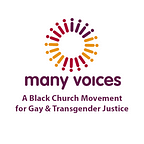Traumatic beginnings in the Black Pentecostal Church: My journey to healing
Rev. Melissa N. McQueen-Simmons
Many Voices presents Rev. Melissa’s story as part of our biweekly series, It’s Time to Talk about Healing. Because religious trauma is a pervasive experience among Black gay and transgender Christians, this series may include language and experiences that are hard for you to read. We want you to take care and be gentle with yourself.
Even before I understood who I was, I listened to countless hateful sermons toward same-gender-loving people — preachers yelling and screaming about “homosexuals” and condemning them to Hell. That condemnation, along with the exhortation for women to be submissive to men as the head of the church and the home, were the trending themes in most sermons.
When confronted with sins or mental health issues, my church’s solution was for the person to go to the altar to be delivered. In front of everyone, the preacher prayed for you, anointed you with oil, laid hands on you, and prayed until he received a confession. Truly, a humiliating experience.
And it wasn’t just the preaching. Family and other church members would ask me questions:
Why are you always playing with the boys?
Why do you never have a boy friend?
Is your best friend “funny”? If she is, you know you don’t need to be hanging around that spirit.
I was not a submissive woman
By high school, it was clear to me that I was attracted to women and to sports and activities that were presumed to be for men — clearly not the submissive woman being preached about. When praying, I asked God to make me heterosexual. When God didn’t change me, I grew angry but continued to worship God in private, hoping for some type of revelation about my sexuality.
After joining the military, I found Vondalyn — a beautiful, petite sergeant who I instantly knew was the woman that I wanted to spend the rest of my life with. She told me early in our relationship that she also struggled with her upbringing in the church and her sexuality.
Two months after the 9/11 attacks, I deployed to Iraq. As rear security for my company commander’s vehicle in the convoy from Kuwait to Baghdad, I was in constant communication with God. In the midst of the bombs, the deaths, and the emotions that were always circling around me, my daily prayer became Byron Cage’s “I Need You Now.” Something about that song provided a sense of peace.
All this time though, I was afraid that God hated me because I was a lesbian. I again read the Bible, and I prayed to be killed if I was not supposed to be attracted to women.
The revelation that God loves me as I am
I survived my deployment, but when I returned, Vondalyn told me that her internal spiritual fight was too much, and she could no longer live this “lifestyle.” The day she left, she cut off all forms of communication with me. I was devastated!
Soon I was diagnosed with depression and post-traumatic stress disorder. In therapy, I began to receive the help I needed to work toward wholeness by revisiting all I had been taught in childhood.
Then I was introduced to Bishop Yvette Flunder, who reframed everything: She shared that God is love, that we were created in the image of God, and that God loves us. Finally I was able to release my anger from the lifetime of stories and sermons and begin looking for churches that affirmed all of me.
Also during this time, Vondalyn and I decided to give our relationship another try, so I introduced her to Bishop Flunder’s healing words, and our relationship has flourished ever since — culminating in a healthy and beautiful marriage!
Today my passion is to serve others who are oppressed or dealing with hurt from the church, and my wife is here to support me every step of the way. We guide our lives on principles that express love, service, loyalty, respect, honor, and joy to ourselves and to others around us.
Still, even though I’ve been liberated from various pains and situations, there is always space for healing. Having embraced and acknowledged the pain, I am now able to recognize when it shows up in my daily life. I continue to reinforce the mantra, “I am enough.”
___________________________________________________
Melissa N. McQueen-Simmons is a native of Greensboro, NC, and a first-generation college graduate. She earned her Master of Divinity with an emphasis in Pastoral Care from Howard University. She is ordained in the United Church of Christ and is installed as pastor and teacher to Many Voices.
